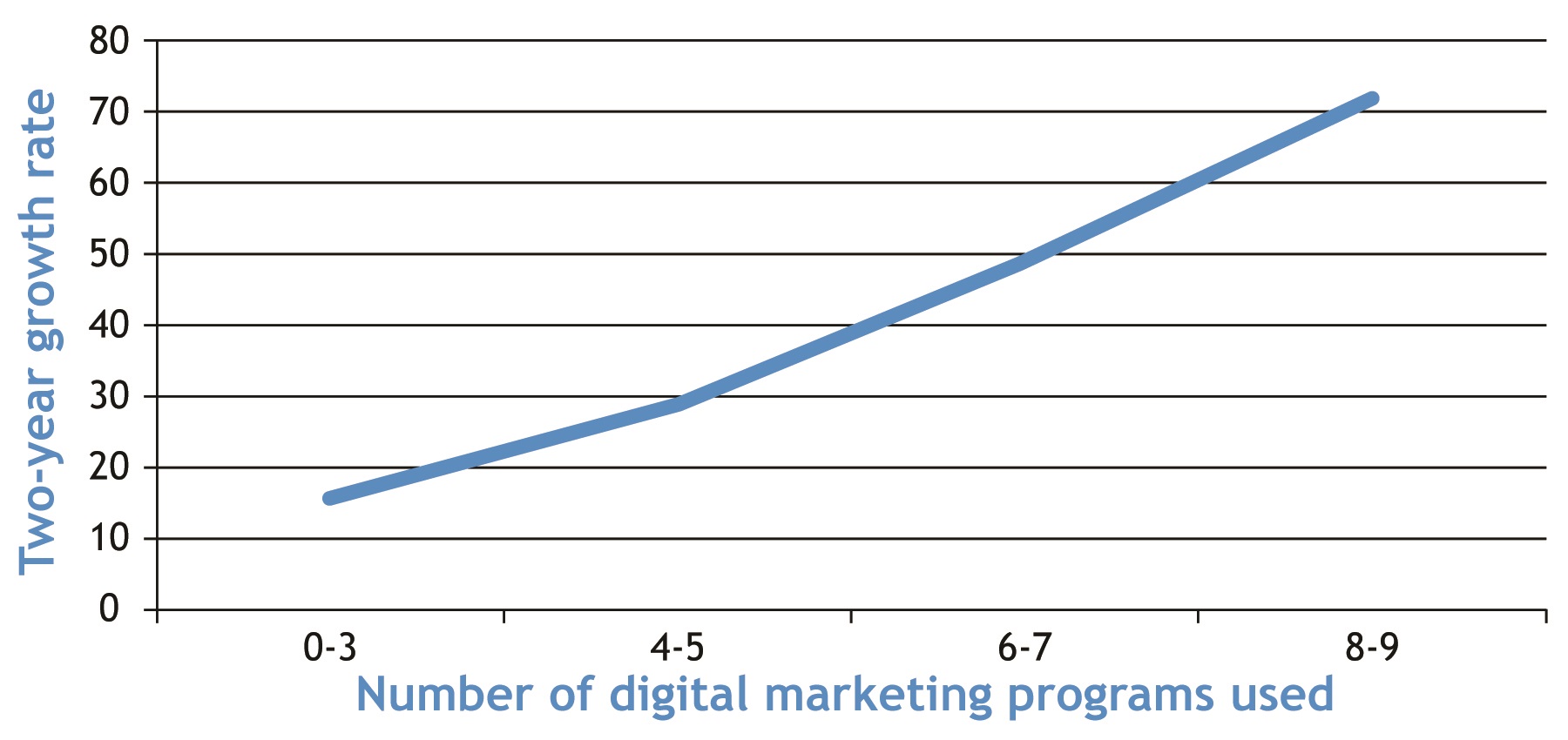This is an excerpt from the second edition of Louis’ Bullseye Marketing: How to Grow Your B2B Business Faster. The first edition was named One of the Best Marketing Plan Books of All Time by Book Authority.
Every time, a mediocre product with great marketing will beat a great one with mediocre marketing.
And companies that market better grow faster.
And yet, many B2B companies don’t have robust marketing programs.
The Companies With the Most Growth
I studied the marketing of 85 B2B SaaS companies with 50-1000 employees and found that they were using a median of seven of the nine programs that I scored them on. However, those with the most robust, multi-channel marketing programs grew about five times faster than those with lesser programs.

A study of more than 1,000 insurance agencies found significantly faster growth for agencies that spent the most on marketing. All agencies got business from referrals, but those that invested got qualified leads and business from many other sources, too.
And when reporting on professional services firms, in their 2020 High Growth Study, Hinge Research Institute wrote:
“There was a systematic relationship between annual growth rates and the proportion of business leads coming from online sources. Respondents that generated more than 66% of their leads from online sources grew more than twice as fast as firms that generated less than 33%.
These ‘Digital Disruptors’ favored every single digital and content technique studied—and they were three times more likely to use digital ads, twice as likely to use video and podcasts, and 50% more likely to use downloadable content and keyword research/SEO. Digital Disruptors showed a preference for traditional techniques that complemented their digital efforts. For instance, they were more likely to focus on partnerships and use phone calls to generate and nurture leads.
Laggards, on the other hand, were more likely to favor techniques associated with live events, suggesting a more manual, face-to-face marketing strategy.”
Creating a Connection
Software, insurance, and professional services: very different industries with one thing in common. Marketing significantly accelerates growth. And countless studies in many other industries have documented the same.
And successful B2B marketing is about far more than promoting a product. Half of your budget should be dedicated to creating an emotional connection with customers through brand marketing so they will think of you when they are ready to buy your kind of product, which 95% typically are not at any given moment.
Product-centric marketing typically is about explaining what makes your product different and better. But customers who aren’t planning to buy soon will rarely understand or remember those differences. And, frankly, true product differentiation is rare.
For example, there are over 10,000 companies offering technology such as CRMs, and software to manage online ads and social media. Typically, hundreds of companies compete in each product category. And if you look at the online reviews, many of them are pretty good.
And in many industries, and none more so than SaaS, as soon as an important new product feature is released by one vendor, many of their competitors copy or surpass it.
Marketing Is Your Competitive Advantage
In Behind the Cloud, Salesforce’s Marc Benioff wrote, “A company can’t ‘own’ its facts. If the company’s facts (speed, price, quality) are superior to the competition, any good competitor will duplicate them, or worse, improve upon them, as soon as possible. What a company can own, however, is a personality.”
I’ve run marketing workshops for CEOs and SMB owners in many industries, and I always ask, “Is what you’re selling truly different from your competitors?” In virtually 100% of cases, these CEOs and owners answer that it is not. That’s in private; that’s not how they’d answer if asked that in public.
Indeed, marketing is often the only sustainable competitive advantage.
Consider Mailchimp
Mailchimp started out as one of many email platforms for small businesses. They added other products along the way but so did competitors. The claim was that their products were easier to use, but in the fall of 2021, on G2.com, they were only ranked the 11th easiest-to-use automation program.
Mailchimp did have outstanding marketing, though. CEO Ben Chestnut claimed they had “a proximity to its customers that its competitors lacked.”
According to SpyFu, they spent an estimated several hundred thousand dollars a month just on search ads. They produced a ton of content, which generated roughly an additional million visits to their site every month. All of this marketing, and more, was done with their distinctive Mailchimp look and tone.
After 20 years, in 2021, Mailchimp had reached $800 million in annual revenue, most of it recurring. And they had a hugely valuable brand. In November of that year, Mailchimp was acquired by Intuit. Employees received $200 million, and the two co-founders—who had never taken on an outside investor—split the remaining $12 billion.